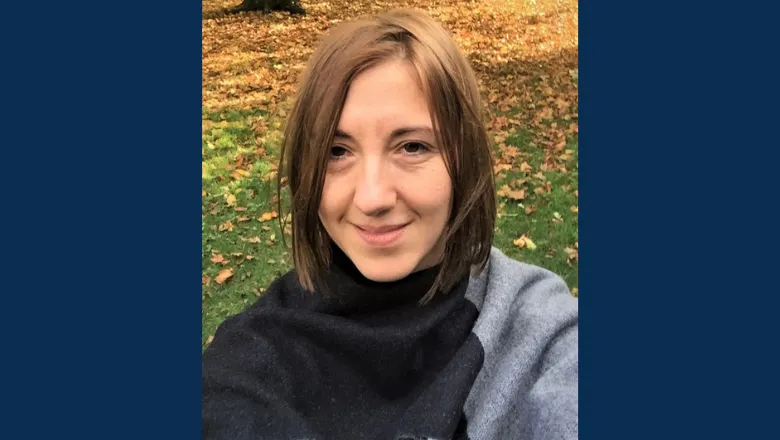10 April 2019
5 mins with…Dr Olena Rudyk
Dr Olena Rudyk is a BHF Intermediate Fellow in the Cardiovascular Research Section of the School. She leads a project to study how do pulmonary vessels sense low blood oxygen and what goes wrong in pulmonary vascular disease such as pulmonary hypertension. Her ultimate goal is to reveal new ways to treat patients with pulmonary vascular conditions.

Briefly, tell me about your background and career up to this point
In 2007 I completed my PhD at Bogomoletz Institute of Physiology in the National Academy of Sciences, Ukraine, in the lab of Professor Vadim Sagach. At that time my husband started his Career Development Fellowship in (now former) NIMR in London, and I joined him soon after my PhD viva. I was a postdoctoral scientist in Paul Taylor and Lucilla Poston labs at King’s until 2010, when I joined Phil Eaton’s lab as a senior research fellow. In 2015 I successfully applied for a BHF Intermediate Fellowship which currently funds my research and salary.
What research are you currently working on?
My fellowship focuses on redox mechanisms of acute hypoxic pulmonary vasoconstriction and cardiovascular adaptation to chronic hypoxia. Currently I am also working on new research ideas into mechanisms of pulmonary vascular remodelling, such as cell cycle dysfunction. I also search for novel therapeutic targets in pulmonary hypertension.
What is a typical day like for you?
During the week, I usually take my son to school and after multiple transport changes, arrive to work at 9.00-9.30. Each day in the lab is different. I spend time planning my work, catching up with students and colleagues, doing experiments in the lab or in the Biological Services Unit. In the afternoon I prefer to focus on writing, reading and analysing the data. When I get back home around 7pm, I catch up with my son, cook dinner, deal with school/household stuff and think about the next day. I am very bad with answering emails during the day, so they are left sometimes for evenings or even weekends.
Where is your research area heading in the next five years?
Hopefully to high impact papers, new ideas and grant applications which will help to build up my group and research niche. Ideally I would like to see some of my work to be carried into translational research. It is challenging to stay at the top of the game, and so many very good scientists in the field work hard towards the next breakthrough. Liaising and actively collaborating with this community is my ultimate goal for the future.
What would you like members of our school to most know about you and your research area?
Pulmonary vascular disease is our current area of interest and so we have accumulated experience and a range of experimental tools to study this. We test basic science ideas in vitro, ex vivo, and in vivo preclinical models. I am very passionate about the integrative nature of our work. In a few years’ time I would like to see redox-based medicine evolving in pulmonary hypertension filed, and hope our research will be a part of it.
What is your favourite part about your current role?
Variety of choice and mental challenges, thinking about new ideas and testing if they work to produce a novel research hypothesis. I am a physiologist by training and therefore enjoy working with animal models. If everything else goes wrong, one successful day in the murine ultrasound room is a much better treat than a Sunday run! Also I like interacting with postgraduate students, some of them are very eager to learn and have lots of enthusiasm.
What do you do with your time outside of academia?
Mostly spend time with my family. We go to various school chess tournaments in London and beyond, socialise with other mums and dads, learn about new books, films, Lego and computer games. I love music and theatre, travelling at attending house parties with my friends, where we gossip about science as well as discuss some serious stuff.
What advice would you give to your 18-year-old self?
Do not listen to other people’s “negative” thoughts and do not get distracted from your path. You are going to do well, just believe in yourself, work hard and keep going.
Who do you look up to (inside or outside of academia)?
I look up to new disciplines in sciences to develop, including artificial intelligence, robotics and machine learning. Ocean Clean-up service is a fascinating idea. Population DNA research by “AncestryDNA” or “23andMe” are great fun, however I am still not sure about getting my own DNA tested.
Any leaving remarks that you would like other members of our School to know about you?
12 years in cardiovascular sciences at the Rayne Institute in St. Thomas’ have been the best time of my professional life. It is a great place to be in, with collaborative and supportive atmosphere, and we always are open to collaborations and new opportunities. It is sad to see so many colleagues leaving, but I sincerely do hope that the Rayne cardiovascular research will sustain and only re-develop, with new early- and mid-career basic research and clinical scientists to come and collaborate with.
QUICK-FIRE:
Favourite Movie: Howl's moving castle; Gone with the Wind; Hobbit; Monty Python and the Meaning of Life – to name a few
Favourite Book: 'The Master and Margarita' by Mikhail Bulgakov
Favourite TV Show: 'Horrible Histories' of course
Favourite Scientist: Late Professor Platon Kostyuk, the world great neurophysiologist and the pioneer of microelectrode techniques and calcium signalling in Ukraine and in the world.

